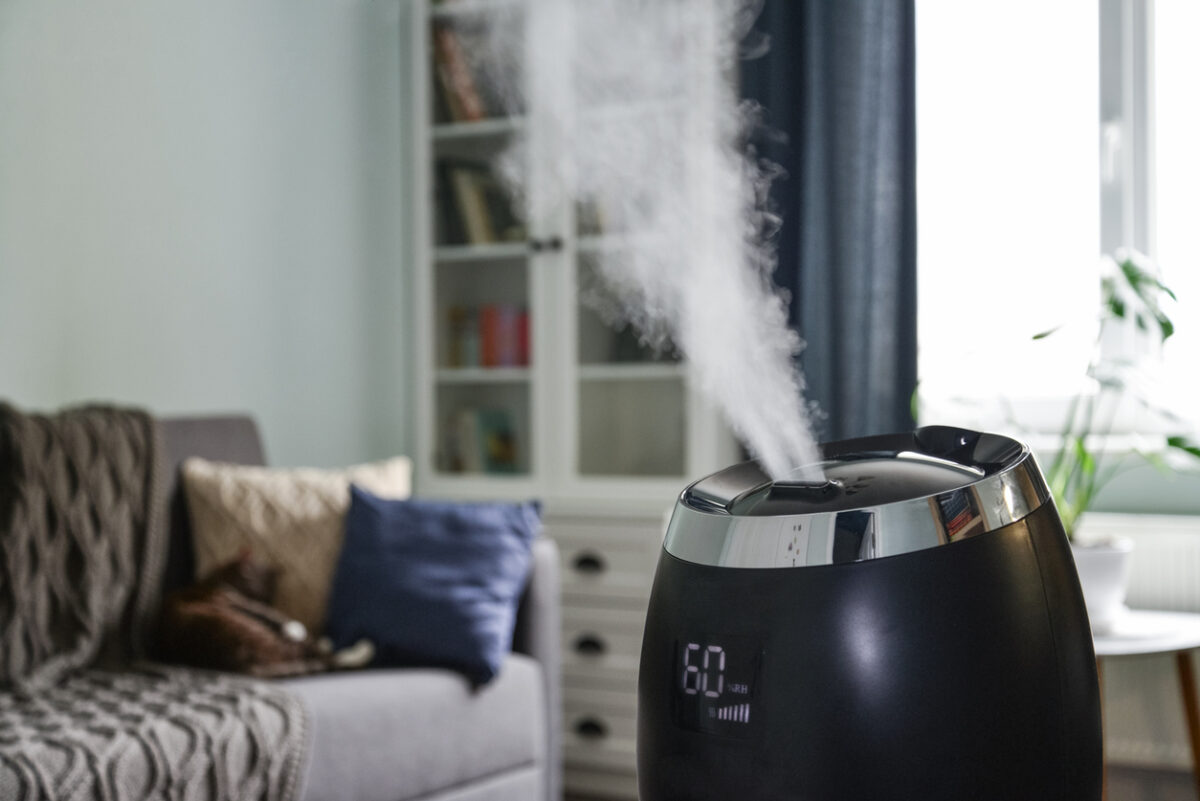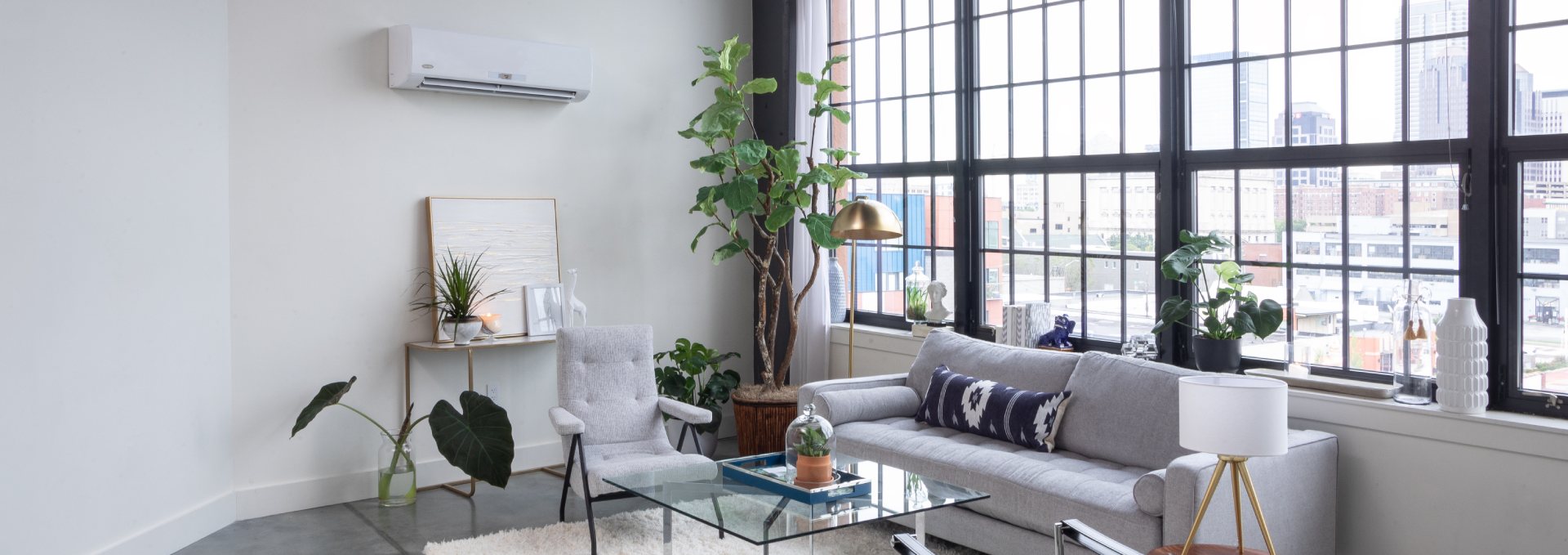
In our January blog, we discussed the negative impact dry air can have on your home and your personal health. We also offered a few solutions for testing the humidity of your air, including scheduling a service call with our team. If your home does have low humidity during the colder months, a whole-house humidifier may be the best solution and will benefit you and your family in several ways.
1. Better Health
Low humidity can dry out your nasal passages, sinuses, throat, and even lungs. By raising indoor humidity to healthier levels, a whole house humidifier may lower your family’s risk of sinusitis and sore throat.
For some people, a humidifier can also reduce the severity of allergies and asthma, although you should always consult with your doctor first. And make sure to keep up on regular maintenance, as a poorly maintained humidifier can spread mold or bacteria, making allergies and asthma worse.
Adding moisture to your home’s dry air may also help prevent the spread of airborne viruses, such as colds and flus. Basically, in drier air, viral droplets evaporate into smaller aerosols faster and float longer, giving them more opportunity to infect the people in your home.
Finally, if you or someone in your family has a cold, cough, or other respiratory disease, healthy humidity levels may help reduce inflammation, open airways, and ease congestion.
2. Better Sleep (and Less Snoring)
Low humidity indoor air can dry out your soft palate, triggering snoring or making it worse. A whole house humidifier moistens the soft palate, throat, and nasal passages. It may also reduce allergies and congestion, both of which can cause snoring.
With less snoring, easier breathing, and better overall comfort, you and your family may sleep better too.
3. Comfort
No matter how much lotion and lip balm you apply through the winter, properly humidified air is going to be more comfortable for you and your family. You’re less likely to develop chapped lips, dry skin and eczema, and irritated eyes and throat.
A whole house humidifier also reduces static in your home: the static that may mess up your hair, cling to your clothes, or give you a shock when you touch a family member or pet.
Drier air also feels colder, so adding moisture will help you feel warmer at lower temperatures.
4. Energy Savings
Because moist air feels warmer, you may be able to lower your thermostat a degree or two, saving money on your utility bills. Powering the humidifier does consume a little electricity, but, as we’ll discuss below, some types of whole house humidifiers are extremely efficient. You can easily have a net savings on your utilities.
5. House
Finally, maintaining moderate humidity in your home is better for your house and many of your belongings.
Excessively dry air can shrink, warp, or crack wood floors, framing, molding, and furniture. It can dry out and cause peeling in paint. It can even damage wooden instruments such as guitars and violins. And the increase in static electricity can damage sensitive electronics. All of this can be prevented by maintaining that 30-50% relative humidity range.
Whole house humidifiers are also better for your houseplants. Most common indoor houseplants come from humid tropical climates, so they tend not to do well in dry air. They’ll thank you for the added humidity with healthier green leaves.
Whole House vs. Portable Humidifiers
As you are probably aware, there are many portable humidifiers available on the market. While these may be a quick, temporary fix for a single room, whole house humidifiers offer many advantages.
- As the name suggests, whole house humidifiers treat the air throughout your house, while portable units generally only treat a single room.
- Most portable humidifiers don’t have hygrometers (humidity sensors). They don’t sense the room’s humidity and maintain it at a set level. Whole house humidifiers always have hygrometers and automatically adjust to maintain ideal indoor humidity.
- Whole house humidifiers are generally healthier, as long as you keep up on annual maintenance. Portable units are prone to developing mold and bacteria, and some types may even spread allergens and irritants (white mineral dust) in the air.
- Portable humidifiers require regular deep cleaning, and you have to refill their reservoirs daily or more often. Whole house humidifiers are easier to maintain. They only need annual maintenance, and they are directly connected to your home’s water supply, so you never have to refill them.
- According to Energy Star, portable humidifiers typically must be replaced every 3-5 years. Whole house humidifiers last 10 years or more. Because many key parts are replaceable, you may even be able to extend their lifetime much further.
- Many whole house humidifiers are more energy efficient than portable units. There are many variables to calculating this, but the most efficient types of whole house humidifiers let your existing HVAC system do most of the work.
Types of Whole House Humidifiers
There are three main types of whole house humidifiers.
Bypass humidifiers periodically spray water onto a pad or filter through which your HVAC system’s blower pushes heated air. Because bypass humidifiers piggy-back on the forced air your HVAC system is already moving, they are extremely efficient. However, they cannot run independently of your furnace and blower. The heat must be running for the humidifier to add moisture. For extremely dry air, this may not be enough.
Fan-powered humidifiers work similarly to bypass humidifiers, but they also have their own fan to push humidity through your ductwork even when your HVAC system’s main blower is not running. They draw a little more electricity but are still relatively efficient.
Steam humidifiers heat water to generate steam, which is then pushed through your ductwork. They are highly effective but use 14 times as much electricity as bypass humidifiers, according to Energy Star. (PDF)
For the Health and Comfort of You and Your Family, We’re Here to Help
Whether you’re trying to decide if a whole-house humidifier makes sense for your home, or are wondering which kind is right for you, we’re here to help. Give us a call anytime or schedule a service call. We’ll give you our best advice. Then we’ll help you with whatever you decide makes the most sense for your family’s health and comfort.

